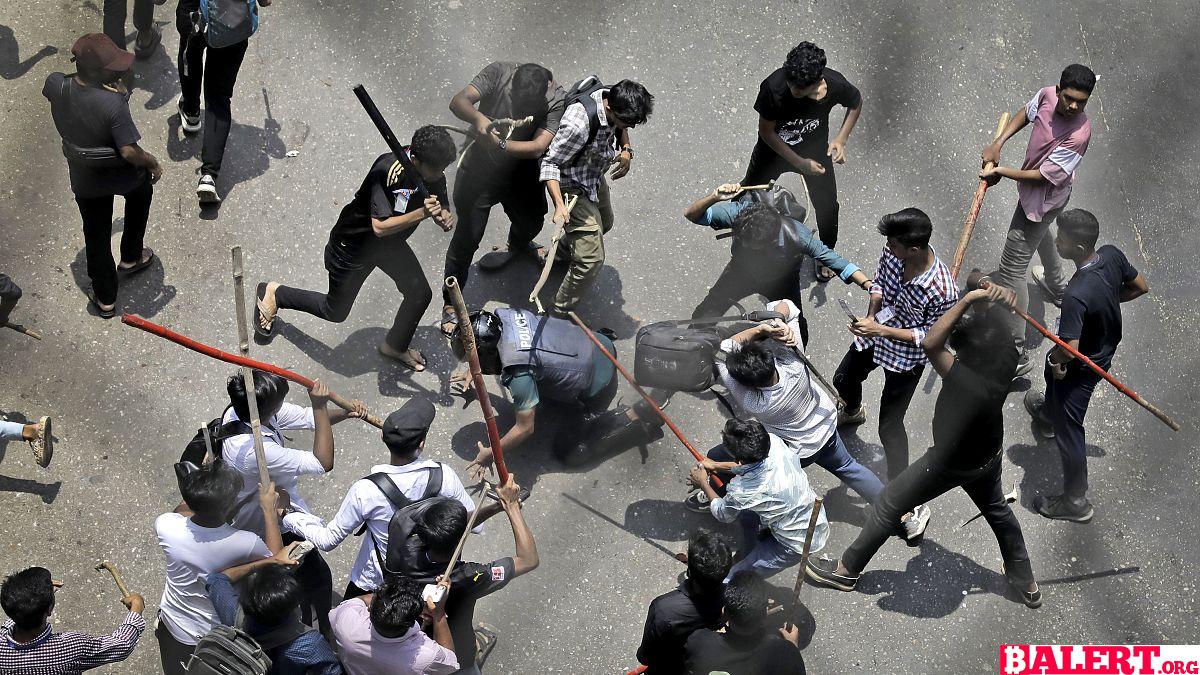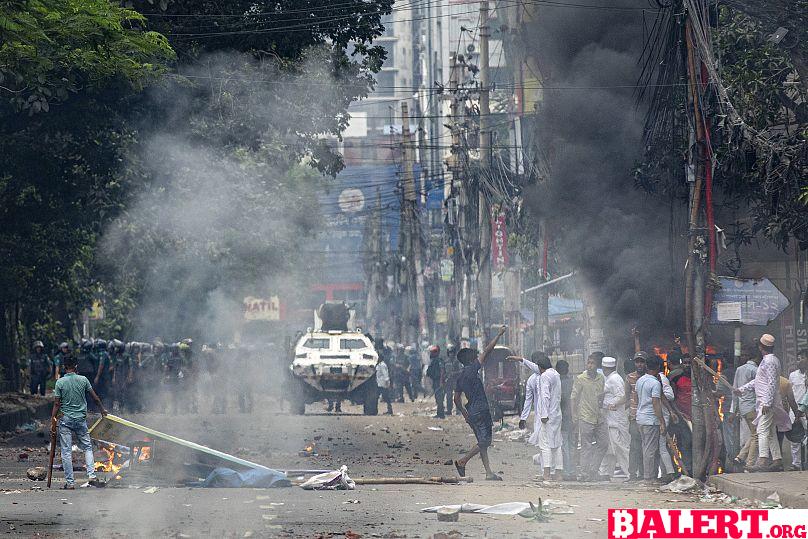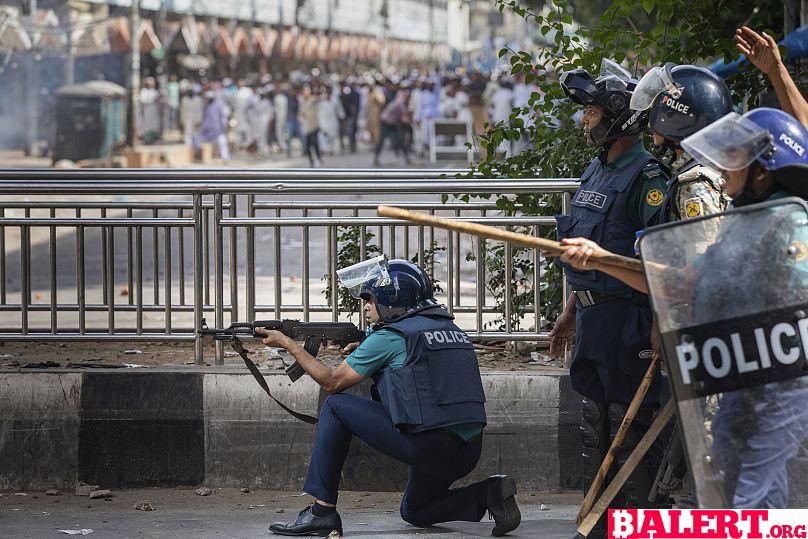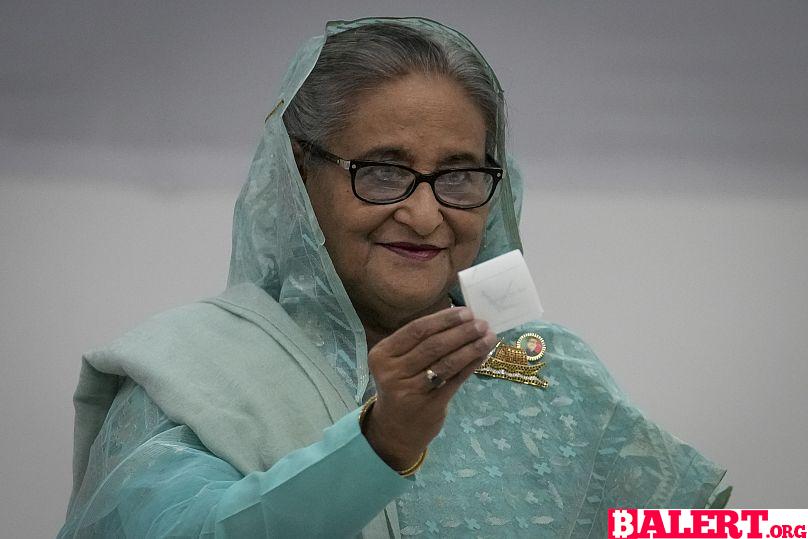World
Bangladesh Extends Curfew Amid Protests Over Civil Service Hiring Quota
Bangladesh has extended the curfew in response to escalating protests over the contentious civil service hiring quota. This decision aims to restore order amid growing tensions and demands for reforms in the recruitment process.

Bangladesh Extends Nationwide Curfew Amid Protests Over Civil Service Hiring Quota

Bangladesh has announced an extension of its nationwide curfew as the Supreme Court prepares to rule on a contentious civil service hiring quota that has ignited violent protests across the country in recent days. In response to the escalating situation, universities have been closed, internet access has been suspended, and the government has mandated that citizens remain indoors. Under the new restrictions, individuals are permitted to leave their homes only between 3 PM and 5 PM for essential errands.
Additionally, the government has declared Sunday and Monday as public holidays, allowing only emergency services to operate during this period. The Supreme Court’s impending decision comes after a controversial quota system, which had previously reserved 30% of government jobs for the descendants of veterans who fought in Bangladesh’s war of independence in 1971, faced mounting scrutiny and backlash.
Initially halted in 2018 following widespread student protests, the quota system was reinstated by Bangladesh’s High Court in June, prompting a new wave of demonstrations. The Supreme Court has now ruled on an appeal, significantly reducing the veterans’ quota to 5%, while stipulating that 93% of government jobs should be allocated based on merit. The remaining 2% will be designated for ethnic minorities, as well as transgender and disabled individuals.
This ruling is seen as a partial victory for student protesters, following days of violent confrontations with police that reportedly resulted in the deaths of at least 100 people, according to national media sources. However, with the majority of communication channels offline, it remains uncertain whether the Supreme Court’s verdict has appeased the protesting students. There has also been no immediate response from the government regarding the situation.
The protests escalated dramatically on Tuesday, following clashes that broke out between students at Dhaka University and law enforcement. Tensions continued to rise as police deployed tear gas, rubber bullets, and smoke grenades to disperse crowds of stone-throwing demonstrators. In light of the violence, police have reportedly been given a ‘shoot-on-sight’ order in a bid to control the unrest.

These protests represent one of the most significant challenges to the Bangladeshi government since Prime Minister Sheikh Hasina secured a fourth consecutive term in January’s elections, which were boycotted by major opposition parties. Critics of the quota system argue that it is inherently discriminatory and primarily benefits supporters of Sheikh Hasina’s Awami League party, which spearheaded the independence movement. They assert that a merit-based system should replace the current quota.
Despite the backlash, Hasina has staunchly defended the quota system, claiming that veterans deserve utmost respect for their sacrifices during the war against Pakistan, irrespective of their political affiliations. Meanwhile, protesters maintain that the quota disproportionately favors those aligned with the ruling party.
In a bid to find common ground, representatives from both the government and student protesters convened late Friday to discuss potential resolutions. Law Minister Anisul Huq indicated that the government is open to dialogue regarding the protesters’ demands, which include not only reforms to the quota system but also the reopening of university dormitories and the resignation of certain university officials for their failure to safeguard campuses.

The main opposition party, the Bangladesh Nationalist Party (BNP), has expressed its support for the protests and is committed to organizing its demonstrations, as many of its members have joined the student-led movements. However, the BNP has distanced itself from any violence, rejecting the ruling party’s claims that they are exploiting the protests for political leverage.
World
Dominique Pelicot Testifies in Harrowing Rape Trial
Join us as Dominique Pelicot courageously testifies in a harrowing rape trial, shedding light on the complexities of trauma and justice. Her powerful story raises crucial questions about the legal system and the importance of support for survivors.

Dominique Pelicot Takes the Stand in Shocking Rape Trial
In a courtroom drama that has captivated France and garnered international attention, Dominique Pelicot, the man at the center of a harrowing rape trial, finally addressed the court. With tears streaming down his face, he recounted how his wife had been instrumental in helping him cope with a tumultuous past marked by trauma. He revealed that he had endured a sexual assault at the tender age of nine while hospitalized, and he also witnessed a gang rape during his teenage years while working as an apprentice electrician on a construction site.
“She didn’t deserve this, I acknowledge that,” Mr. Pelicot stated, his voice barely audible as he struggled to convey his emotions. The gravity of the situation weighed heavily on him, and the courtroom fell silent, straining to catch his every word.
Now 71 years old, Mr. Pelicot faces serious allegations of drugging his wife, Gisèle Pelicot, whom he has been married to for half a century, over a span of nearly ten years. Prosecutors contend that he used drugs to render her comatose, allowing him to rape her repeatedly. Furthermore, authorities allege that he went so far as to invite numerous men into their home, facilitating a nightmarish scenario where they, too, engaged in the assault of his wife.
Overall, 51 men, including Mr. Pelicot, are on trial concurrently, primarily facing charges related to the aggravated rape of Ms. Pelicot. Among them, one individual has already pleaded guilty to similar crimes, admitting to drugging his own wife to assault her and inviting Mr. Pelicot to partake in the horrific act while she was incapacitated.
Mr. Pelicot’s unexpected testimony came after a tumultuous start to the trial. Just a week in, he was stricken with severe health issues that forced him to miss four consecutive days in court. The head judge ultimately decided to postpone proceedings, as Mr. Pelicot was diagnosed with kidney stones, a kidney infection, and prostate complications, adding yet another layer of complexity to this already harrowing case.
World
Meta Bans Russian State Media Outlets from Social Media Platforms
Explore the implications of Meta’s decision to ban Russian state media outlets from its social media platforms. Understand the impact on information dissemination and the ongoing battle against misinformation in the digital landscape.

Meta Imposes Global Ban on Russian State Media Outlets
In a significant move, Meta Platforms, Inc., the parent company of Facebook, has announced the prohibition of Russian state media outlets, including RT (Russia Today) and Rossiya Segodnya, from all its social media platforms. The decision stems from the company’s concerns regarding the deceptive strategies employed by these media organizations to execute covert influence operations across the internet.
Meta made this announcement on Monday, emphasizing that the ban will be enforced worldwide across its various platforms, such as Instagram, WhatsApp, and Threads. The rollout of this ban is expected to take place over the coming days.
Statement from Meta
A spokesperson for Meta elaborated on the decision, stating, “After careful consideration, we have expanded our ongoing enforcement actions against Russian state media outlets. As a result, Rossiya Segodnya, RT, and other affiliated entities are now banned from our applications globally due to their involvement in foreign interference activities.”
For further insights into this development, watch the video in the player above.
World
Trump Recalls Alleged Assassination Attempt While Golfing
Explore Donald Trump’s chilling recollection of an alleged assassination attempt he experienced while enjoying a round of golf. Delve into the tense moments and his reflections on safety, fame, and the unpredictability of public life.

In a recent interview on the social media platform X, Republican presidential nominee Donald Trump recounted a harrowing incident he claims to have experienced while playing golf. Trump described how, during a peaceful Sunday morning round with friends, the tranquility of the day was abruptly shattered by the sound of gunfire in the air.
“It was a beautiful day, everything was just perfect,” Trump reflected. “Then all of a sudden, we heard shots being fired—probably around four or five in total.” He went on to explain that a Secret Service agent was the first to spot the suspect, who was allegedly armed with an AK-47, a powerful assault rifle.
“The agent saw the barrel of the weapon and immediately took action, returning fire at the barrel and aiming in the direction of the bushes,” Trump detailed. “I would have loved to have sunk that last putt, but we decided it was best to leave the scene promptly.”
Trump expressed his gratitude towards the agents and a vigilant civilian who aided in tracking down the suspect, who was eventually apprehended following a high-speed chase.
Suspect Faces Multiple Federal Gun Charges
The FBI has identified the suspect as Ryan Wesley Routh, accusing him of targeting Trump during his time at the golf club in West Palm Beach, Florida. According to an FBI report, Routh had allegedly hidden among the hedges of the golf course for an astonishing 12 hours. Authorities discovered an SKS-style assault rifle, a GoPro camera, and a bag of food at the scene.
The 58-year-old Routh is now facing two serious federal gun charges. If convicted on both counts, he could face a combined maximum sentence of 20 years in prison. Notably, neither of the charges is directly related to an assassination attempt. The first charge pertains to possessing a firearm despite a prior felony conviction, which carries a potential 15-year sentence, a fine of $250,000 (€225,000), and three years of supervised release.
The second charge involves possession of a firearm with an obliterated serial number, which could result in a five-year prison term, the same financial penalties, and also three years of supervised release. As the investigation continues, additional charges could be forthcoming.
While the motive behind Routh’s actions remains unclear, his digital footprint reveals strong political affiliations, particularly concerning issues surrounding Ukraine and China. Routh consistently expressed support for Ukraine across various social media platforms, even claiming to have orchestrated a recruitment scheme for international volunteers aiming to assist Ukraine in its fight against Russia’s invasion. This behavior has been denounced by Ukrainian soldiers and members of the International Legion, who disavowed Routh’s actions and motives.
-

 Business4 months ago
Business4 months agoObituary: Dan Collins
-

 Business3 months ago
Business3 months agoThe Significance of Jackson Hole: A Central Banking Tradition
-

 Gaming5 months ago
Gaming5 months agoMore than a thousand students vowed not to work for Amazon and Google due to the Nimbus Project.
-

 World5 months ago
World5 months agoRussia and North Korea Strengthen Defense Ties
-

 Business5 months ago
Business5 months agoJump Crypto Invests $10 Million in Pro-Crypto PAC
-

 Article5 months ago
Article5 months agoCreative Design Applications Developed with Artificial Intelligence
-

 Tech2 months ago
Tech2 months agoNew Leaks and Features About the Samsung Galaxy S25 Ultra
-

 Gaming5 months ago
Gaming5 months agoThe Inspirational Success Story of Avon’s Founder Who Sold Books Door to Door














